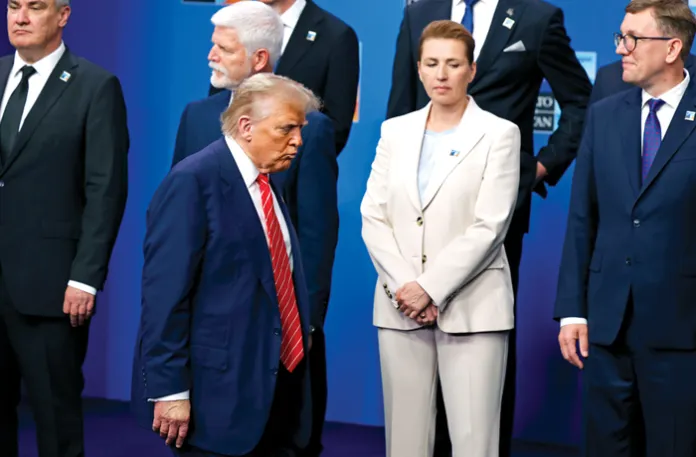Just 11 months before President Donald Trump won the 2024 election, then-Sen. Marco Rubio (R-FL) championed a law based on fears about the 45th and 47th commander in chief: that in a second, nonconsecutive term, Trump would unilaterally pull the United States out of the 76-year-old NATO alliance.
The measure, cosponsored by Sen. Tim Kaine (D-VA), requires “advice and consent of the Senate or an Act of Congress before suspending, terminating, or withdrawing U.S. membership in NATO,” and was included as a provision of the 2024 National Defense Authorization Act, signed into law in December 2023.
The fear was not unfounded.
Trump has long shown an antipathy for the alliance, which he views primarily as a protection racket, in which the 31 other member nations are “free riders” sponging off America’s military might.
The argument that European security is equivalent to American security is one he does not embrace.
Trump has called the war in Ukraine a “European situation” that “should have remained a European situation.”
“It doesn’t affect us, it’s not our people, it’s not our soldiers,” he has said more than once, and is fond of pointing out that the U.S. and Europe “have an ocean that’s separating us, right? … A big, beautiful ocean.”
Since taking office, Trump has cut off all direct military aid to Ukraine and has forced a “coalition of willing” NATO nations to pay cash up front for any U.S. weapons they want to supply Ukraine.

“The nice part [is] … it doesn’t cost us anything anymore. … They are buying everything from us … we actually make money,” Trump said before departing for London this month. “I don’t want to make money. You know what I want? I want that war to stop, because last week, 7,018 people got killed.”
Trump’s sole goal, he has repeatedly said, is to stop the killing, something that would help him secure the Nobel Peace Prize, for which he has been openly campaigning and believes he deserves, claiming to have “solved” six or seven wars since taking office.
While seeking a quick end to the war, Trump has shown no interest in helping Ukraine defeat Russia, instead calling Ukrainian President Volodymyr Zelensky a “dictator” who “provoked” Russia, while blaming him for defending his country instead of finding some imagined diplomatic way out.
“You don’t start a war against somebody that’s 20 times your size,” Trump said in April.
Since his heralded Alaska summit with Russian President Vladimir Putin, which produced no tangible progress toward peace and seemed to only embolden Putin to escalate his daily drone attacks and harden his demands, Trump has turned farther away from Ukraine and its NATO allies.
While repeatedly saying he’s “disappointed” in Putin and “not happy at all” about the lack of progress toward peace, Trump has steadfastly refused to take sides.
Instead, after a month of Putin’s intransigence, Trump devised a way to wriggle out of his threat to impose “very severe consequences” on Russia by issuing a new ultimatum to NATO.
“I am ready to do major Sanctions on Russia … when all NATO Nations STOP BUYING OIL FROM RUSSIA,” Trump posted on Truth Social on Sept.13.
The demand shocked NATO allies, many of whom have made great strides in weaning themselves off cheap Russian oil and natural gas.
The 27-nation European Union has already banned the purchase of almost all Russian oil, which now makes up around 2% of oil imports to the E.U.
Trump’s demand that all NATO nations stop buying Russian oil is a nonstarter as a practical matter because two of NATO’s 32 national leaders, Hungary’s Viktor Orban and Slovakia’s Robert Fico, have pro-Putin leanings and remain heavily reliant on Russia for their oil.
The gambit, though, allows Trump to avoid sanctioning Putin while blaming NATO and doing nothing to upset his close relationship with Putin.
“If NATO does as I say, the WAR will end quickly, and all of those lives will be saved!” he said in his Truth Social post. “If not, you are just wasting my time.”
While leaders of America’s European allies, including the United Kingdom, France, Germany, Italy, and Finland, routinely heap praise on Trump for his peace effort, they privately question Trump’s commitment not just to Ukraine but also to the NATO alliance, specifically its Article 5 guarantee that an attack on one is an attack on all.
Russia’s recent drone incursion into Poland was the latest example of Trump seeming disengaged and disinterested in NATO’s response.
Trump was dining out in a local Washington restaurant as Polish and Dutch fighter jets scrambled to shoot down the 19 Russian drones.
The next morning, he made a cryptic post on Truth Social, almost as if he were a curious bystander.
“What’s with Russia violating Poland’s airspace with drones?” he posted. “Here we go!”
Only a handful of the drones were shot down, with the rest eventually crashing to the ground, suggesting some may have been unarmed “decoy” drones used to test or confuse air defenses.
The Russian Foreign Ministry denied that its nightly drone attack on Ukraine “included any targets in Poland” but didn’t deny violating Polish airspace.
Trump later suggested the incursion might have been a mistake, even as Poland and several other NATO members insisted it was deliberate provocation.
“This was not an accident or a mistake; it was deliberate,” Zelensky said in a video address. “The Russians are testing the limits of what is possible. They are testing reactions. They are watching closely how NATO armed forces act: what they can do and what they cannot do yet.”
Not only did Trump seem not to take the event seriously, but the U.S. military was notably not involved in the defense of Poland, even though the U.S. is the biggest, most powerful member of the alliance.
The absence of U.S. forces was “simply a matter of scheduling,” and “a function of the rotation of forces,” U.S. Gen. Alexus Grynkewich, NATO’s supreme commander, said at a news conference. “As far as U.S. military assets. I’m right here.”
“America’s commitment to NATO is ironclad in every sense,” added NATO Secretary General Mark Rutte. “There’s no doubt.”
Except there is doubt, growing doubt, about whether Trump, who couldn’t bring himself to come to Poland’s defense with even a mild rebuke of Putin when a NATO nation’s sovereignty was violated, would really be there when it counts.
An emboldened Russia sent a drone through the airspace of another NATO member, Romania, a few days later, and former Russian President Dmitry Medvedev has begun making veiled threats against Finland, one of NATO’s newest members, which shares an 800-mile border and a history of war with Russia.
“The main thing for the Finnish establishment is not to forget that confrontation with us could lead to the collapse of Finnish statehood once and for all,” Medvedev wrote in an opinion essay for the Russian news agency Tass.
Meanwhile, Trump seems more focused on the Western hemisphere, assembling an air and naval armada to target suspected drug ships off the coast of Venezuela, and dispatching the military to fight crime in selected U.S. cities.
As for the 2023 law that aims to prevent Trump from quitting NATO, it has little practical effect, given it would be subject to a Supreme Court challenge and that Trump could achieve the same goal without a formal withdrawal.
Trump could simply treat the alliance with “benign neglect,” pulling troops out of Europe and scaling back U.S. military support, arguing that Europe needs to pull more of its weight.
And because NATO is an organization that must have the consensus of all 32 members to act, Trump would still be able to play his “trump card” to block any action he doesn’t like, such as Ukraine’s admission to NATO.
TRUMP TO TARGET ‘RADICAL-LEFT’ GROUPS FUNDING VIOLENCE THAT LED TO CHARLIE KIRK’S DEATH
In any troubled marriage, there comes a point when one of the partners emotionally checks out of the relationship, even while the pretense is maintained that the relationship is fine.
Trump gives every indication that he is over NATO, frustrated by the failure to end what he calls “Biden and Zelensky’s war,” and would be perfectly happy to leave both Ukraine and NATO to their own devices.
















